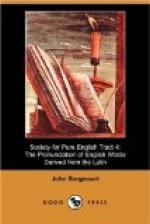Son[’o]rous mettal blowing Martial sounds.
The Italian is sonoro, and our word was simply the Latin sonorus borrowed bodily at a somewhat late period. Hence the stress remains on the penultima. Skeat thought that the word would at last become ‘s[’o]norous’. It maybe hoped that Milton’s line will save it from the effect of a false analogy.
[Footnote 1: I regard this statement as inaccurate. The _-ous_ in these words does not come from the nominative ending _-us_, but is the ordinary _-ous_ from L. _-osus_ (through Fr.). It was added to many Latin adjective stems, because the need of a distinctly adjectival ending was felt. Similarly in early French _-eux_ was appended to adjectives when they were felt to require a termination, as in pieux from pi-us. Compare the English capacious, veracious, hilarious, where _-ous_ is added to other stems than those in o. Other suffixes of Latin origin are used in the same way: e.g. _-al_ in aerial, ethereal.—H.B.]
In classifying by stems it will be well to add, where possible, words of Greek origin. Except in some late introductions Greek words, except when introduced bodily, have been treated as if they came through Latin, and some of the bodily introductions are in the same case. Thus ‘an[ae]sthetic’ is spelt with the Latin diphthong and the Latin c. Even ‘skeleton’ had a c to start with, while the modern and wholly abominable ‘kaleidoscope’ is unprincipled on the face of it.
STEMS ENDING IN -ANT AND -ENT. These are participles or words formed as such. Our words have shed a syllable, thus regentem has become ‘regent’. Disyllables follow the ‘apex’ rule and lengthen the first vowel, as ‘agent’, ‘decent’, ‘potent’. Exceptions are ‘clement’ and ‘present’, perhaps under French influence. Words of more than two syllables with a single consonant before the termination throw the stress back and shorten a long penultima, as ‘ignorant’, ‘president’, ‘confident’, ‘adjutant’. Where there are two heavy consonants, the stress remains on the penultima, as ‘consultant’, ‘triumphant’, even when one of the consonants is not pronounced, as ‘reminiscent’. In some cases the Latinists seem to have deliberately altered the natural pronunciation. Thus Gower has ‘[’a]ppara[’u]nt’, but the word became ‘app[’a]rent’ before Shakespeare’s time, and later introductions such as ‘adherent’ followed it. What right ‘adjacent’ has to its long vowel and penultimate stress I do not know, but it cannot be altered now.
STEMS ENDING IN -ATO AND -UTO. These are mostly past participles, but many of them are used in English as verbs. It must be admitted that the disyllabic words are not wholly constant to a principle. Those verbs that come from _-latum_ consistently stress the last vowel, as ‘dilate’, ‘relate’, ‘collate’. So does ‘create’, because of one vowel following another. Of the rest all the words of any rank have the stress on the penultima, as ‘vibrate’, ‘frustrate’, ‘m[’i]grate’, ‘c[’a]strate’, ‘p[’u]lsate’, ‘v[’a]cate’. Thus Pope has




